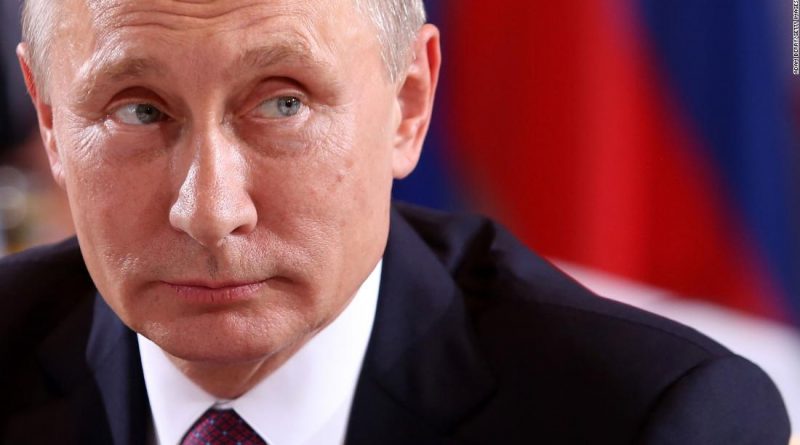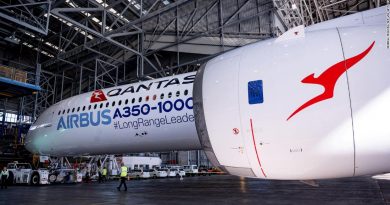‘There is literally no paper trail’: How Russia experts say Putin hides a fortune
Dubbed “Putin’s Palace,” the 190,000 square-foot mega-mansion was purportedly built for his personal use with funds from billionaire oligarchs, whom he allegedly allowed to flourish in Russia’s notoriously corrupt economy so long as they shared the wealth — with him.
The property has its own amphitheater, underground hockey rink and private seaport, according to a documentary produced by jailed Russian opposition leader Alexey Navalny’s anti-corruption group. There is a no-fly zone in the skies above and a no-boating zone in the surrounding waters.
The magnificent fortress stands in stark contrast to the tiny 800-square-foot apartment Putin claims in his official 2020 financial disclosure.
Yet, despite the opulence of the hilltop retreat, “I would be very surprised if Putin ever sets foot in there again,” Nate Sibley, an expert on Russian corruption who advises members of Congress, told CNN.
Sibley said the palace symbolizes what he sees as a bygone era of Putin pursuing, through the wealth of oligarchs, a luxurious lifestyle that he could never afford on his government salary. While Putin is believed to have amassed a hidden fortune by such means earlier in his career, Sibley said, he has since become less reliant on his wealthy benefactors over the years and has surrounded himself instead with government and military loyalists who share his hardline nationalist views.
That shift, some Russia experts told CNN, may make it more difficult to make Putin personally feel the sting of economic sanctions the US and its European allies have imposed to punish him for invading Ukraine.
Putin has positioned himself, as Sibley put it, “above the fray.”
It wasn’t always that way. Nearly two decades before Putin drew international ire for his most recent unprovoked invasion of Ukraine, the Kremlin had Russia’s richest man plucked off his private jet and charged him with crimes against the state.
Putin’s bold move against the billionaire oil magnate was seen as a message to other oligarchs: You might be next.
The tactic demanded the unwavering loyalty of the oligarch class.
The ensuing influx of cash, gifts and goodwill is one explanation for how Putin, who claims a salary of just $140,000 a year, is suspected of being one of the richest people on the planet. He is rumored to own or have access to not only the Black Sea palace, but also a $100 million yacht, according to published reports. CNN was unable to verify Putin’s connection to the palace or yacht. The Kremlin has dismissed reports of Putin’s purported hidden wealth.
That the properties and other possessions aren’t in his name doesn’t matter, said Tom Burgis, author of a book on international money laundering called “Kleptopia.” Burgis likened Putin to The Godfather and said it’s understood that when he asks an oligarch for something, it’s not really a request.
“Ultimately they owe everything they have to the boss. And with the click of a finger, as he has shown in the past, Putin can take everything,” Burgis said. “However influential they may seem, they are ultimately dependent on him.”
Several of Putin’s closest associates — including childhood friends, a woman who was reportedly his former lover, and a professional cellist who is the godfather of one of his daughters, have secretly amassed huge fortunes outside Russia during his time in power, according to leaked financial documents.
A complicated web of shell companies, offshore banks and hidden transactions obscures their wealth, with accounts spirited away inside one another like Russian nesting dolls. But a series of leaks in recent years from firms that facilitate the offshore finance system, including the Panama Papers and the Pandora Papers, have stripped away some of those layers of secrecy.
Proekt, an independent Russian media outlet that was banned in the country last year, reported that Putin started a relationship with Krivonogikh in the 1990s before he became President, and that her daughter has a patronymic middle name that means “daughter of Vladimir.”
In addition to the Monaco apartment, Krivonogikh owns a majority share in a ski resort where Putin has been seen hitting the slopes, several other luxury apartments in St. Petersburg, and a yacht, the Post and the Guardian reported.
The leaked documents don’t make clear the source of the fortunes amassed by Putin’s inner circle. But in several cases, businesses and financial institutions linked to them have won lucrative state contracts.
Earlier this month, the Justice Department announced the formation of a task force devoted to enforcing sanctions and other economic restrictions designed to isolate Russia from global markets. The KleptoCapture task force will target not only Russian officials and oligarchs, but “those who aid or conceal their unlawful conduct.”
Gary Kalman, the director of the US office of Transparency International, an anti-corruption advocacy group, said enforcing sanctions will not be easy.
“It is extraordinarily difficult for law enforcement to try and ‘follow the money’ because at some point you are going to literally hit a brick wall,” Kalman said. “There is literally no paper trail.”
The United States and the United Kingdom are ideal places to stash large amounts of money, they are among the deepest financial markets in the world, and both accept anonymous shell companies, according to the Atlantic Council.
In the eyes of some longtime Putin observers, the enigmatic Russian leader has shifted his focus from pursuit of wealth to consolidation of power.
“It’s difficult to understand precisely what’s happening inside the Kremlin and inside the mind of Vladimir Putin. But he is more and more in a tight relationship with a very small group of people, and they tend to be more on the military and intelligence side rather than business people,” said Jill Dougherty, former Moscow bureau chief for CNN, “because, obviously, if Putin cared about business, he would not be prosecuting this war in Ukraine.”
“Right now it is not up to the oligarchs,” said Stanislav Markus, an associate professor of international business at the University of South Carolina. “It is the guns, not the money that speak loudest in the Kremlin today.”
Regardless of whether priorities have shifted inside the Kremlin, Maria Pevchikh, head of investigations Navalny’s Anti-Corruption Foundation, argues both the palace near the Black Sea and Russia’s invasion of Ukraine demonstrate the way Putin sees himself as much more than a government official.
“He sees himself as a czar, as king of some sort,” Pevchikh told CNN. “He has huge plans. He has the vision of him being a historical figure, being so powerful, so mighty, so important, and they invest a lot of money into this narrative.”
Scott Glover contributed to this report.




